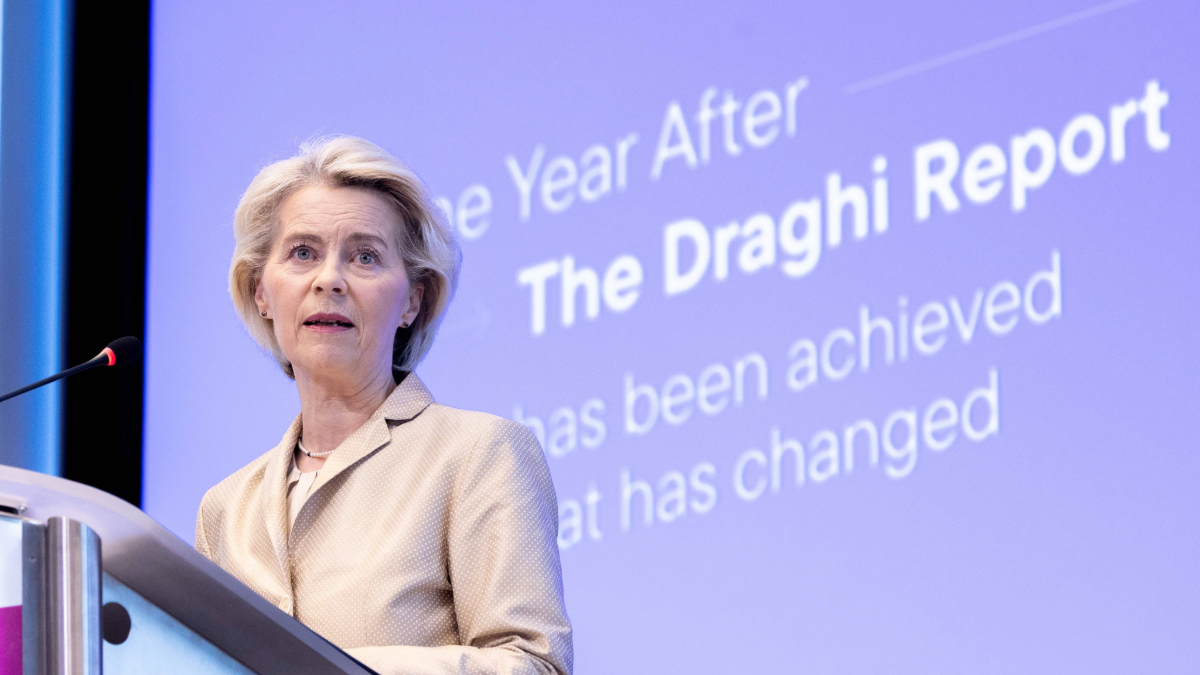Europe Isn’t Weak—It Just Pretends To Be. Here’s How to Fix That.
Johnny Ryan / Oct 23, 2025This piece is part of the "Ideas for Europe’s Future" series by Tech Policy Press. Read more about the series here.

European Commission President Ursula von der Leyen addresses the audience during the conference ‘One Year After the Draghi Report’ at the EU Charlemagne building on September 16, 2025 in Brussels, Belgium. (Photo by Omar Havana/Getty Images)
The question of this moment is whether Europe will be a bastion of democratic resilience or a vassal.
We have seen what happens when a nation dares to stand up to United States President Donald Trump. Brazil, under President Lula da Silva, has shown the way. When Trump sought to bully Brazil with crushing 50 percent tariffs, Lula did not flinch. He declared in a New York Times article addressed to Donald Trump: "Brazilian Democracy and Sovereignty Are Non-Negotiable."
He went further. He passed the Digital Statute of the Child and Adolescent, a law that compels Silicon Valley giants to change their products or be banned from Brazil. No more addiction. No more surveillance. No more grooming of children for profit.
Trump’s response was not rage or retaliation, but respect. He called for talks to end the tariff war. Why? Because power is not just in the barrel of a gun or the size of a trade deficit. Power is in the will to say no.
Europe’s official statements say “no,” but its actions whisper “yes.” Yes to Trump’s demands. Yes to his threats. Yes to the idea that American tech firms should be above European law. Yes to the notion that a foreign oligarchy should be allowed to shape European public discourse and children’s minds. Europe did not reach for the “trade bazooka,” an anti-coercion instrument in response to Trump's threats. It imposed a modest fine in a long-delayed action against Google, but has yet to impose any really severe penalties on US tech that radically changes how they operate on our soil.
Seeing Europe meek, Trump’s ambassador to Europe now demands not only that the United States review EU tech laws, but also Europe’s rules for pollution and environment and corporate responsibility, too. Europe has prided itself on being the guardian of the rules-based order. Trump’s demands are humiliating.
The historical parallel is sobering. Opium wrecked Chinese society in the 1800s. When the Qing dynasty attempted to stop British traders from selling opium in China, Britain fought two “Opium Wars” to impose its will: British traders in China would be immune from Chinese law, much as Trump wants US firms in Europe to be immune from European law. The American social media firms are our opium. Their recommender systems are addictive. They expose our children to horrors. They wreck our politics.
To begin reclaiming control, Europe must chart a path toward digital sovereignty. There are three key levers to achieve this: politics, policing, and procurement.
First, politics: emulate Brazil. Stand firm. Speak with courage. When Trump demands that American tech firms be immune to European law, say “no” and act accordingly. This is the time to enforce European laws.
Second, policing: the General Data Protection Regulation (GDPR) is Europe’s greatest weapon against digital oligarchy, child harm, and foreign political interference. But for years, it has been allowed to wither. It is now deeply unfashionable and subject to a deregulatory push.
The moment Europe allows foreign giants to break its laws, it kills the bloc’s own startups. Its own digital SMEs. It’s own future. While there is much in Mario Draghi’s report to endorse, this point is missing: enforcing the GDPR in Ireland against the giants is a prerequisite for European digital competitiveness. European innovators will never scale while foreign titans dominate by illegally collecting and using data. That illegal data use is the titans’ true vulnerability if the EU were only to apply its law.
Ireland, the chief regulator for Google, Meta, Apple, TikTok, and Microsoft, has done almost nothing of substance. The European Commission has allowed it to do nothing. We have allowed the giants to break our law with impunity for a decade.
It is time for Ursula von der Leyen to play the Irish card. Not to weaken the law, but to finally enforce it. To make Ireland enforce the GDPR not just on small firms, but on the largest, most dangerous ones. To stop them from dominating the European market by breaking the law. To show the world that Europe’s laws apply to markets of all sizes.
This need not be an act of defiance against Trump: it is merely the quiet, daily activity of Europe enforcing its own rules in its own market. The only revolution is that Ireland has never come under much political pressure from the European Commission to do so.
Third, procurement: start buying European. Even the European Commission uses Microsoft Office. As Proton CTO Bart Butler said at a recent Open Markets Institute /Article 19 event: “I would prefer 2 million dollars of contracts for services I provide to 2 million dollars gifted to me in a Horizon 2020 project.” Contracts matter. Public procurement shapes markets. When Europe spends its money, it should be for its own benefit.
Denmark is moving. Schleswig-Holstein is moving. The Austrian army has moved. The French police have moved. European governments are collaborating on OpenDesk, an alternative to Microsoft Office. But the European Commission? It has not even left X. Europe has cloud companies, office software companies, and enterprise systems that are built and operated on its soil. If Europe is to have a robust “Eurostack” of technologies, the Commission should set an example by adopting them.
Europe must remind itself that it is not weak. It is only pretending to be. Europe has the market. It has the technology. It has the laws. Now Europe needs only the politics, policing, and procurement.
Authors
